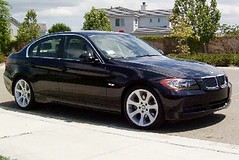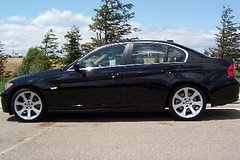

|
|
 |
 |
 |
|
 |
BMW Garage | BMW Meets | Register | Today's Posts | Search |
 |

|
BMW 3-Series (E90 E92) Forum
>
Nitrogen - in your boots!
|
 |
| 04-20-2008, 07:35 PM | #1 |
|
Lieutenant
   
200
Rep 469
Posts |
Nitrogen - in your boots!
Recently had to buy 2x new rear tyres (as stated in another thread)... Whilst looking for replacements, noticed that a few places (including Costco, the membership-only "club" for buying stuff in bulk) made a bit of a Song and Dance about using Nitrogen gas to pump their tyres.
I suppose other places (an petrol stations) use the 'normal' air mixture - whatever that is. Question is - is this valid, or all a lot of hot air? I remember in the recent F1 Ferrari/McLaren spying case things around special gases used for tyre inflation, but does it make a difference to you or I??? |
| 04-20-2008, 07:49 PM | #2 |
|
Lieutenant
   
22
Rep 584
Posts |
Nitrogen has a more stable temprature range than moist air, which you'll never approach in a road car...although the max power brigade will tell you its worth 10bhp.
 |
|
Appreciate
0
|
| 04-20-2008, 09:06 PM | #3 | |
|
The Tarmac Terrorist

1009
Rep 29,344
Posts
Drives: 997.2 GT3
Join Date: Mar 2007
Location: ''Fandango Towers''
|
Quote:
Gotta love BarHP!!!!
__________________
997.2 GT3
 |
|
|
Appreciate
0
|
| 04-21-2008, 02:55 AM | #4 |
|
Lieutenant General
   1824
Rep 13,043
Posts
Drives: BMW M340I G20
Join Date: Aug 2007
Location: UK
|
Nitrogen is supposed not to bleed out through rubber unlike air and pressure is kept more constant, but a £2.50 a corner i'll keep the foot pump handy.
|
|
Appreciate
0
|
| 04-21-2008, 03:27 AM | #5 |
|
Second Lieutenant
 15
Rep 295
Posts |
Air has 78% nitrogen as standard, How do you get the existing air out of the tyres?
If air bleeds out thru the rubber due to a smaller molecular size, you will eventually be left with only nitrogen! I think a lot of hot air and a good money spinner for costco |
|
Appreciate
0
|
| 04-21-2008, 03:30 AM | #6 | |
|
Lieutenant General
   1824
Rep 13,043
Posts
Drives: BMW M340I G20
Join Date: Aug 2007
Location: UK
|
Quote:
 |
|
|
Appreciate
0
|
| 04-21-2008, 06:20 AM | #7 |
|
Colonel
 
129
Rep 2,426
Posts
Drives: E93 335i M-sport
Join Date: May 2007
Location: Surrey - UK
|
Also need to consider the effects of moisture.
The N wil be "dry" whereas compressed air always has some moisure associated with it, this moisture is also supposedly worth 0.005 Hp in the right bend at the right speed if you've been eating too much. I think If I could get them done, I would, but it's not gonna get me a faster car... only green caps  They swear this stuff is the daddies in South Africa, my old mans runs it religiously, but as he drives like a nanny, I don't know what benefit it realy offers  SJ SJ |
|
Appreciate
0
|
| 04-21-2008, 06:58 AM | #8 |
|
The Tarmac Terrorist

1009
Rep 29,344
Posts
Drives: 997.2 GT3
Join Date: Mar 2007
Location: ''Fandango Towers''
|
Your old chap lives in Sud africa?
__________________
997.2 GT3
 |
|
Appreciate
0
|
| 04-21-2008, 07:32 AM | #9 |
|
Second Lieutenant
 
5
Rep 241
Posts |
http://www.racq.com.au/cps/rde/xchg/...s_ENA_HTML.htm
"Summary While using nitrogen in passenger car tyres may produce some benefits in some applications, it is questionable if the average motorist will derive any measurable benefit from its use." |
|
Appreciate
0
|
| 04-21-2008, 10:14 AM | #10 |
|
Colonel
 
129
Rep 2,426
Posts
Drives: E93 335i M-sport
Join Date: May 2007
Location: Surrey - UK
|
got it in one steve... this is for the "what can I mod next" crowd...
Sadly I do include myself here....  Yep Carlos I'm South African by birth. SJ |
|
Appreciate
0
|
| 04-21-2008, 10:41 AM | #11 | |
|
The Tarmac Terrorist

1009
Rep 29,344
Posts
Drives: 997.2 GT3
Join Date: Mar 2007
Location: ''Fandango Towers''
|
Quote:
Man i didnt know that. I know a Sud african dude. He has a major accent though.You must have been a UK resident for some time mate to lose your accent! He has 6 bullet wounds in his stomach. He said its very dangerous there. Both your parents Sud african? Carlos
__________________
997.2 GT3
 |
|
|
Appreciate
0
|
| 04-21-2008, 10:57 AM | #12 | |
|
Major
 
90
Rep 1,032
Posts
Drives: 2006 330i & 2010 535i
Join Date: Jun 2006
Location: Sunnyvale/Tracy, Ca
|
Quote:

__________________
  2006 330i Jet Black w/ Beige Leather/Sport/Prem/Step/Shades/Xenon/Logic 7 |
|
|
Appreciate
0
|
| 04-21-2008, 01:38 PM | #13 |
|
Colonel
 
129
Rep 2,426
Posts
Drives: E93 335i M-sport
Join Date: May 2007
Location: Surrey - UK
|
it is better, but we're talking nth's of a smidgeon
 I'd still have it if I could find it ? SJ |
|
Appreciate
0
|
| 04-21-2008, 02:55 PM | #14 |
|
Captain
    26
Rep 635
Posts |
I use Nitrogen in my tyres, but its really not all that necessary with RFT's. One of the big benefits of nitrogen fill is that its more temperature stable and so less susceptible to blow outs.
The reason I use it now is that it makes for a slight improvement in ride quality and means I don't have to worry about checking the pressures regularly as it leaks through the sidewall much slower. |
|
Appreciate
0
|
| 04-21-2008, 04:55 PM | #15 |
|
Colonel
 
129
Rep 2,426
Posts
Drives: E93 335i M-sport
Join Date: May 2007
Location: Surrey - UK
|
yeah I think for the RFT crowd it's a useful improvement considering how they leak a little and that little drop in pressure can have such an effect on handling and wear.
SJ |
|
Appreciate
0
|
| 04-21-2008, 05:28 PM | #16 | |
|
Private First Class
 
12
Rep 168
Posts
Drives: 335D SE Touring
Join Date: Nov 2007
Location: Lincolnshire UK
|
Quote:
Nitrogen does not expand as much are normal air when it gets hot and does not contract as much when it gets cold. Now you may notice that you are advised to check the pressure of your tyres when cold. The reason for this is that when you drive, the tyres get warm and the air inside them expands. As such, in theory if you read the pressure of the tyres when hot they could appear to be at the correct pressure yet if you then let them get cold, and read the pressure again they would appear to be underinflated. So if you always inflate your tyres to the recommended pressure when they are hot (say after the drive to the garage forecourt) then in reality your tyres will always be under inflated and as we all know this is not good for the tyres or the car (uses more fuel etc). So in this case, nitrogen may help because after that drive to the forecourt, even though the tyres will be hot, because nitrogen does not expand as much, your pressure reading will not be as far off. BUT there will still be SOME expansion. But also, when you use normal air in the tyre, the pressure is increasing and decreasing each time you drive. This is actually required. By example, if you look in the handbook, it is recommended that if you are constantly driving at high speed you should run at a higher pressure. So for normal driving, you actually want the air in your tyres to expand if you are getting them hot. Does nitrogen leak through rubber less? Don't be silly. But when a tyre has it's pressure increased and decreased a lot then because the tyre is actually moving (a tiny bit) on the rim, there is scope for the air to escape. Add this to the increase in the internal tyre pressure and you can see how this works. If the pressure changes less (like it would with nitrogen) then you could argue that there is less scope for this happening so you could argue there is less leakage although this is nothing to do with the size of the atoms at play. So if you are that anal about your tyres being spot on then the correct thing to do would be to check the pressure of your tyre WHEN COLD before each journey. To be fair for more people, once a week is fine. If it needs more (or less) air, pump it up. Doing this, normal air does the job just fine. But of course what if you are running nitrogen and you need a top up? Do you drive to the garage that sells the stuff with under inflated tyres? Last edited by networkguy; 04-21-2008 at 06:40 PM.. |
|
|
Appreciate
0
|
| 04-21-2008, 05:48 PM | #17 |
|
Major General
  
197
Rep 6,110
Posts
Drives: Don't know yet!
Join Date: Jul 2007
Location: UK
|
Good stuff Network Guy.
So where does one get nitrogen to fill your boots? Is it readily available? How much does it cost to top up? I'm thinking of trying Nitrous Oxide........just for a laugh  |
|
Appreciate
0
|
| 04-21-2008, 06:02 PM | #18 |
|
Second Lieutenant
 
5
Rep 241
Posts |
All this talk of tyres made me actually check the tyre pressures in my car. It's the first car I have ever bought where all four were absolutely spot on
 |
|
Appreciate
0
|
| 04-21-2008, 06:12 PM | #19 | |
|
Major General
  148
Rep 5,080
Posts
Drives: 530d
Join Date: Dec 2005
Location: Gloucestershire
|
Quote:

__________________
 Gone: Fiesta - Focus - E46 320dSE - E91 330dMSport - E82 135iMSport - R55 JCW Clubman - M135i Now: 530d |
|
|
Appreciate
0
|
| 04-21-2008, 06:35 PM | #20 |
|
Private First Class
 
12
Rep 168
Posts
Drives: 335D SE Touring
Join Date: Nov 2007
Location: Lincolnshire UK
|
|
|
Appreciate
0
|
| 04-21-2008, 07:50 PM | #21 | |
|
Captain
    26
Rep 635
Posts |
Yes.. But you miss my point. In my opinion, the ride comfort is improved. Likely due to the stable pressure at varying operating temperature. Like I said, its not really an issue with runflats.
I'm certainly not arguing with your assertion that 2.1bar of nitrogen is the same as 2.1 bar of air. Boyle and Charles beat you to that one ;-) The reason that higher pressures are recommended for high speed driving is not directly related to preventing pressure expansion. A tyre inflated to a higher pressure generates less friction hence less heat from that friction and thus less thermal expansion which can result in expansion and ultimately a "Catastrophic tyre event" - Blowout ;-) As for lower leakage with nitrogen filled tyres, this is easily proven. The density of oxygen free nitrogen is higher than air - particle size is larger. Air consists of 78.08% nitrogen, 20.95% oxygen, 0.93% argon, 0.038% carbon dioxide, trace amounts of other gases, and a variable amount (average around 1%) of water vapor. so the 21.92% of other gases is susceptible to permeate the tyre wall, either during shock as you describe, or just simply as the rubber ages. The water vapour constiuent of air, when compressed, also increases and this accelerates the perishing of the rubber. Quote:
|
|
|
Appreciate
0
|
 |
| Bookmarks |
|
|